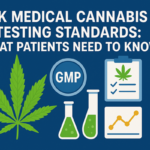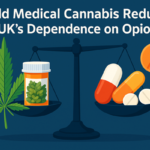What Illness Qualifies for Medical Marijuana in the UK?

Since the legalisation of medical cannabis in the UK on November 1, 2018, patients and curious minds alike have been eager to understand how this once-taboo treatment fits into modern healthcare. The shift in law marked a turning point, spurred by high-profile cases like those of Billy Caldwell and Alfie Dingley, two children with severe epilepsy whose families fought tirelessly for access to cannabis-based treatments. But while the door has been opened, it’s not quite as simple as popping down to your GP for a prescription. So, what illnesses actually qualify for medical cannabis in the UK, and how does it all work? Let’s dive in.
The legal landscape: A quick recap
In the UK, cannabis-based products for medicinal use (CBPMs) can only be prescribed by specialist doctors registered with the General Medical Council (GMC). These aren’t your everyday GPs; think neurologists, pain specialists, or oncologists with expertise in specific fields. The National Institute for Health and Care Excellence (NICE) provides guidelines, but the decision ultimately rests with the specialist, who must weigh the evidence, the patient’s needs, and the lack of licensed alternatives.
The catch? The NHS treats most CBPMs as “specials” because they lack a licence. This adds layers of complexity; specialists must justify their use, and funding approval can be a hurdle. As of March 2025, the reality is that NHS prescriptions remain rare, with many patients turning to private clinics for faster access. However, let’s concentrate on the conditions that can facilitate your admission.
Conditions that qualify on the NHS
The NHS has a cautious approach, reserving medical cannabis for a handful of severe, well-evidenced conditions where conventional treatments have failed. Here’s what’s on the list:
- Severe, treatment-resistant epilepsy
This is the poster child of medical cannabis in the UK. Children and adults with rare forms like Lennox-Gastaut syndrome or Dravet syndrome, where seizures don’t respond to standard drugs, may qualify. Epidiolex, a purified CBD oil, is one of the few licensed products approved for these conditions after rigorous clinical trials. For unlicensed CBPMs containing THC, specialists can step in if the benefits outweigh the risks. - Chemotherapy-induced nausea and vomiting
For adults undergoing chemotherapy, relentless nausea can be a brutal side effect. Nabilone, a synthetic THC-based drug, is licensed for this purpose. Unlicensed cannabis products might also be considered if other anti-nausea meds fall short, though this is less common on the NHS. - Muscle spasticity in multiple sclerosis (MS)
People with MS often battle painful muscle stiffness and spasms. The UK specifically licenses Sativex, a THC-CBD spray, to treat this symptom when other treatments fail. It’s a rare win for accessibility, though still tightly controlled.
These are the big three, and they dominate NHS prescribing. In 2023, community settings issued approximately 5,000 prescriptions for licensed cannabis-based medicines, a figure that does not include hospital data or private prescriptions. Still, the numbers pale in comparison to the estimated 1.8 million Brits using illicit cannabis for medical relief, according to a 2023 YouGov poll.
Beyond the NHS: private clinics expand the scope
Here’s where it gets interesting. Private clinics, unbound by NHS funding constraints, can prescribe CBPMs for a broader range of conditions. Specialists still need to follow GMC guidelines and justify their choices, but they’ve got more wiggle room. Some conditions popping up in private practice include:
- Chronic Pain
From fibromyalgia to cancer-related pain, chronic pain is a top reason patients seek medical cannabis privately. NICE remains sceptical, citing weak evidence, but the patient demand is undeniable. Private specialists might prescribe oils, capsules, or even cannabis flower if they see a clear unmet need. - Anxiety and PTSD
Psychiatric conditions like anxiety, depression, and post-traumatic stress disorder (PTSD) are gaining traction. Many clinics report that 40% of their patients use cannabis for mental health, often when traditional therapies or medications fail. - Neurodegenerative Diseases
Conditions like Parkinson’s or Huntington’s disease, which cause tremors and mobility issues, are on the radar. Evidence is still emerging, but some specialists are willing to explore CBPMs for symptom relief. - Migraines and Arthritis
These debilitating conditions don’t make the NHS cut, but private prescribers see potential. Patients often report better pain management and sleep, key factors in quality of life.
The eligibility catch
It’s not just about having the right illness to qualify; you also need to meet certain requirements. Specialists typically want evidence that you’ve tried at least two conventional treatments without success. Your medical history, current meds, and the severity of your condition all play a role. On the NHS, the process is even more stringent: funding approval frequently depends on exceptional circumstances, leaving many individuals to rely on their own resources.
Why so restrictive?
Evidence, or the lack thereof, remains a significant issue. While patients swear by cannabis for everything from insomnia to endometriosis, the scientific jury’s still out for most conditions. NICE’s 2019 guidelines rejected the routine use of cannabis for chronic pain due to insufficient data, and the government is demanding more clinical trials before easing restrictions. When you factor in the persistent stigma among doctors, caution becomes inevitable.
Yet, the tide’s turning. The UK’s medical cannabis market is projected to hit £300 million by the end of 2025, and studies like the T21 Project, tracking over 4,600 patients, are building real-world evidence. Patients over 65 are increasingly signing up, challenging stereotypes about who uses this stuff.
What’s next?
As of March 2025, the government’s stance is clear: no plans to expand NHS access without rock-solid proof. While two NIHR-funded epilepsy trials are currently in progress, the NHS continues to pose significant challenges. Private medical cannabinoids dispensary clinics, meanwhile, are filling the gap, offering hope to those willing to pay.
If you’re wondering whether you qualify, start with your GP. They can’t prescribe CBPMs but can refer you to a specialist, NHS or private, depending on your condition. Sometimes, it’s a matter of luck, but perseverance can yield positive results. And who knows? With research accelerating, the list of qualifying illnesses might just grow.
Medical cannabis in the UK is a story of progress and frustration, a tantalising option that’s still out of reach for many. Whether you’re battling seizures, spasms, or something less defined, it’s a space worth watching. The revolution’s started; it’s just not fully bloomed yet.


